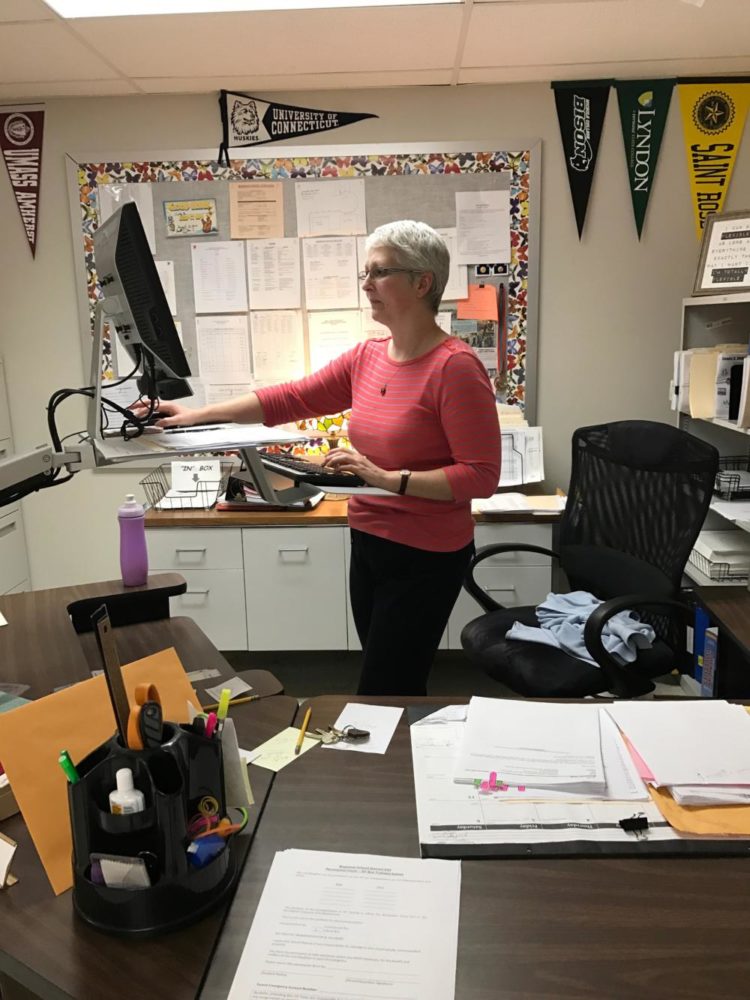Taking A Stand Against Taking A Seat?
Guidance department secretary Cindy Berardinelli recently started using a standing desk, and touts benefits of her new perspective on work.
May 9, 2017

Tom Comferford and Carter Singleton enjoy pillow polo during adaptive gym class.
The majority of students at Lewis S. Mills spend all day sitting. Arguably, a student sits for a total of six hours everyday. The moment you step into a classroom you often see students either hunched over, resting their elbows on the desks to keep their heads propped up, or others with their heads completely down on the desk, most likely snoozing.
There has been increasing attention paid to the way we spend our days, by science, by employers and even by schools in recent years. As a result, a growing number of people have opted to not take their routines sitting down.
Angela Vassar, a physical education teacher at Lewis S. Mills for the past 10 years, explained: “Movement promotes happiness… Sitting all day? It’s terrible, it makes you depressed.”
Vassar explained: “When you are sitting you aren’t releasing endorphins, and endorphins are the body’s natural way of making you happy.”
Lindsey Konkel, health journalist and author of ‘What Are Endorphins?’ summed it up by saying, “Endorphins are morphine-like chemicals produced by the body that help diminish pain while triggering positive feelings. They’re sometimes referred to as the brain’s ‘feel-good’ chemicals, or natural painkillers.” Endorphins are key to staying healthy. So, scientifically, it’s a no-brainer that sitting all day just isn’t good for you.
Jim Thomas, author of “Does Stretching Release Endorphins,” wrote that “Physical activity, including stretching, increases production of endorphins, the neurotransmitters in the brain that can elevate mood and alleviate pain and depression.”
Vassar, who teaches a variety of classes at Mills, from resistance training to yoga, has seen such effects.
“Gym class is a really valuable time,” said Vassar, recommending that “we all should take a timeout during the day, for our physical and mental well being.”
Sebastian Tobolski, a junior enrolled in the sports and games gym class, revealed that he looks forward to gym on the days he has it.
“It’s just a break from school to have some fun,” he said.
J. Kip Matthews, Ph.D, a sport and exercise psychologist, endorsed physical activity as beneficial not just for students, but for everyone.
Our overall well being is pretty dependent upon our physical health, he noted in an interview with the lifestyle publication The Daily Burn, and without a doubt sitting six hours of the day is not as physically healthy as spending some of that time in motion.
“The less active we become, the more challenged we are in dealing with stress,” Matthews told the health publication.
Some of the staff at Mills are taking matters into their own hands. Cindy Berardinelli works in the guidance office and is a proud user of a “standing desk.” The “standing desk” has become popular among many people who work a job that requires them to sit at a desk.
“It makes me feel better not to sit all day long,” Berardinelli simply stated.
She also mentioned that her overall focus improved with the use of a “standing desk.”
Despite clearly favoring her own new perspective on the work day, Berardinelli turned reflective when asked to consider whether she foresaw a future in which students spent their days standing at similar desks, or in reimagined classrooms.
After a few moments of thought, Berardinelli concluded, “I’m not sure. It would be really hard.”
There may be some truth to Berardinelli’s thoughts: since the beginning of public schooling, students have sat in desks all day long, making changes difficult and unlikely.
Still, Vassar advocated, “Get up and out of your desk!”










Rachel Sampson • May 12, 2017 at 9:08 am
What a wonderful article by Sammy Mahieu. How true! More movement is best for our bodies and mind. Great job bringing attention to this issue.